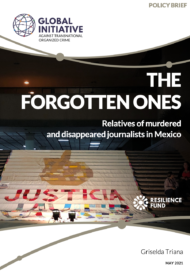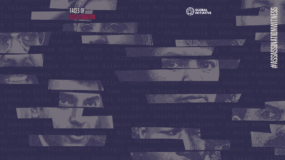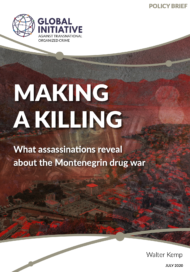Posted on 14 May 2021
The recent murder of a Greek reporter has alarmed Europe, questioning the security of journalists and uncovering possible institutional links to organized crime.
On 9 April 2021, Giorgos Karaivaz drove home from work following his usual commute. He parked his car and took a few steps towards his house, where he was ambushed and shot, receiving a total of ten bullets. It was early afternoon in Alimos, a quiet seaside suburb in Athens.
The execution-style murder shocked Greece, receiving extensive national media coverage. ‘Whoever thinks that they can silence journalists must remember that there are at least another 6 000 who will investigate the case and demand to know what happened,’ said Maria Antoniadou, head of the journalists’ union in Athens, ESIEA.
The murder also sparked international reactions. The president of the EU Commission, Ursula von der Leyen, tweeted her support for freedom of the press, and Anthony Bellanger, general secretary of the International Federation of Journalists, said they were committed to seeking justice for the murder.
Greek authorities have started an investigation, focusing on identifying the assailants. A door-to-door CCTV footage collection is underway and telephone communications are being scanned. Security cameras recorded two masked men leaving the crime scene on a motorcycle, but one question is yet to be answered: who wanted him dead?
The deputy minister for citizens’ protection, Lefteris Economou, suggested a link between the killing and organized crime. He pointed to a series of suspected contract killings in the past three years, indicating an ‘open war’ between rival gangs. However, Economou stressed that it was still too early to make assumptions.
In Athens, more than ten unsolved contract killings have occurred since 2017, consequences of a turf war between organized crime syndicates that compete with one another in blackmail cases and the ‘protection’ of nightclubs, illegal casinos or brothels. Profits are huge, and fought over. The rival gangs consist mainly of Greek nationals, many of whom have been convicted and released after a few years in prison. Although previous contract killings have largely targeted other criminals, it seems that they might now be turning to other groups of people: those exposing organized crime.
Karaivaz was a prominent journalist, covering organized crime since the late 80s for major TV channels and newspapers. He had also founded a website, bloko.gr, a few years before his murder, reporting extensively on the Greek mafia and corrupt police officers. In a recent post, he admitted to receiving death threats.
According to Panos Sompolos, a veteran crime reporter and the former head of ESIEA, a possible motive for the murder could be that Karavaiz was writing an article on organized crime. ‘He might have been writing an exposé, and those who were implicated ordered his killing. It is also possible that the perpetrators wanted to teach journalists in general a lesson,’ he said.
In July 2020, Karaivaz had been questioned by law enforcement authorities after the national intelligence service carried out a probe into police corruption, and sex and gambling rackets. Two suspects linked to the case were killed in 2019 and 2020. A third, a former police officer, was also gunned down in 2018. The intelligence service reportedly found that the journalist had been in contact with all three victims. Karaivaz categorically denied any involvement, claiming that it was part of his job to talk to criminals and corrupt officers. The case file remains open.
‘Karavaiz’s murder exposed a dark truth that so far almost everyone has tried to ignore,’ said Nikolas Leontopoulos, co-founder of Reporters United, a network of reporters aiming to support investigative journalism in Greece. He noted that there are strong indications, based on Karaivaz’s reporting, that point to pockets of corruption inside the Greek police, with officers collaborating with organized criminal groups. ‘The media, the government and the police should at least acknowledge the problem and try to tackle it instead of pretending it does not exist,’ he added. However, Leontopoulos was sceptical that the country’s institutions would show true resolve in investigating the murder.
Killings of journalists can no longer be considered rare in Greece. In July 2020, tabloid owner Stefanos Chios survived after being shot by a hooded man outside his home in Athens. Another journalist, Socrates Giolias, was murdered by masked assailants at the entrance of his house in 2010. A guerrilla gang claimed responsibility for the murder but, to date, no one has been arrested.
‘If it is confirmed that there is a connection between Karaivaz’s assassination and his journalistic work, the consequences will be grave for press freedom both in Greece and in the whole of Europe,’ said Pavol Szalai, head of the EU/Balkans desk at Reporters Without Borders. Greece has been placed 70th out of 180 countries in the NGO’s World Press Freedom Index for 2021, the worst place among traditionally Western countries.
Karavaiz’s brutal killing has added an additional layer of serious concern for investigative journalists in Europe. In the words of Szalai: ‘The current situation is a dangerous cocktail for press freedom.’



